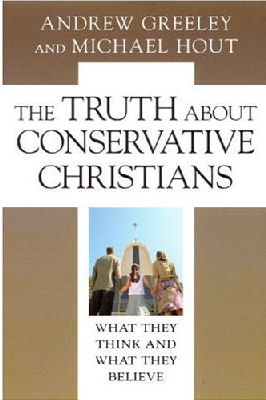
|
Posted November 20, 2006
Book: The Truth About Conservative Christians: What they think and what they believe Authors: Andrew Greeley and Michael Hout The University of Chicago Press. Chicago. 2006. Pp. 206 An Excerpt from the Jacket:
Andrew Greeley and Michael Hout here explode common misconceptions about these misunderstood members of the American public. This eye-opening book expertly conveys the complexity, variety, an sensibilities of Conservative Christians, dispelling the myths that have long shrouded them in prejudice and political bias. For starters, Greeley and Hout reveal that class and income have trumped moral issues for these Americans more often than we realize: a dramatic majority of working-class and lower-class Conservative Christians backed liberals like Jimmy Carter and Bill Clinton during their runs for the presidency. The same Christians also favored redistribution and government spending to help America’s cities and poor. And when it comes to abortion, most Conservative Christians are not consistently pro-life in the absolute fashion usually assumed: they are still more likely to oppose the practice than other Americans, but 86 percent of them are willing to tolerate it when the health of the mother is in jeopardy or when the woman is raped, and 22 percent of them are even pro-choice. What do Conservative Christians really think about evolution, homosexuality, or even the meaning of the word of God? Answering these questions and many more, The Truth about Conservative Christians will interest — and surprise — a broad range of readers, especially in this heated election year. An Excerpt from the Book: This chapter began as an exploration of the question of whether the Conservative Christian sexual ethic was stricter than that of other white Protestants and whether it has been affected by the sexual revolution. In fact, they are generally speaking more likely to be strict in their sexual attitudes and behavior than are the Mainline Protestants, somewhat more relaxed on premarital sex and abortion than the demands of their clergy would be willing to tolerate and also increasingly sympathetic to homosexuals. However, the real sexual revolution has been the increase in “regular” sexual partnerships among the nonmarried, sometimes with cohabitation, behavior by the standards of traditional Christian ethic — if not always of Christian behavior — which might well be called fornication or adultery. While Conservative Protestant widowed, separated, and divorced men and women are marginally less likely to enter such partnerships many of them are involved in such behavior, though apparently it does not appreciably narrow the gap between their own personal happiness and that of the married members of their denominations. These relationships tend to erode somewhat their commitment to the conservative ethic on other matters of sex and reproduction. Yet the erosion does not prevent those in the relationships from agreeing on issues of abortion and homosexuality with their clergy. “Family values” or “moral values” apparently means abortion and homosexuality and not regular non-marital sexual partnerships. Moreover, it is interesting and surprising that the sexual life stories of Conservative Protestants show more sexual partners than do the stories of mainline Protestants — exactly the opposite of what the Puritan/Reformation posture of their denominations might have lead us to expect. If is not our intention here to suggest either hypocrisy or deliberate self-deception. If you want that, read Sinclair Lewis’s Elmer Gantry (1927). We did not dig for inconsistencies. We simply found them in data on representative samples of American adults. The contradictions we found arise as part of the human condition. Unlike Lewis in another way, too, we are genuinely surprised by these findings. They show that in their own way Conservative Protestants are as inconsistent as are our fellow Catholics — whom we have often suspected of having a monopoly on religious inconsistency. As the evidence piles up we cannot escape the argument that the Conservative Protestants are a much more complicated group of humans than either pop psychology’s attempts to explain them away or pundits’ hand-wringing about moral values deciding an election would imply. Table of Contents: 1. Introduction 2. The religion of conservative Christians: a return to the Reformation 3. Conservative Christians in American politics 4. The politics of Conservative Christianity in Black and White 5. Freedom, inequality, and Conservative Christianity 6. A social portrait of Conservative Christians 7. Conservative Christian growth: membership begins at home 8. Conservative Christians in the “Sexual Revolution” 9. The Conservative Christian family and the “Feminist Revolution” 10. Happiness and lifestyle among Conservative Christians 11. The Pentecostals: Ultimate Conservative Christians 12. Conservative Christians and Catholics: too estranged for alliance 13. Conclusions |
|
